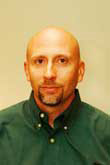Few people could have imagined the acceleration of corporate
influence that has occurred in the last two years despite the economic downturn
associated with those corporations and the election of Barak Obama, who was
repeatedly demonized as a socialist.
More shocking, possibly, has been the corporate influence on the public discourse about universal public education, driven by Secretary of Education Arne Duncan and promoted through celebrity tours by billionaire Bill Gates and ex-chancellor Michelle Rhee.
Recently, Bessie has speculated about the logical progression of the current accountability era built on tests and destined to hold teachers accountable for their students' test scores (despite the evidence that teachers account for only about 10-20% of achievement)--hologram teachers. And Krashen believes that the corporate takeover of schools is at the center of the new reformers' misinformation tour.
While Bessie's and Krashen's comments may sound like alarmist
stances--possibly even the stuff of fiction--I believe we all should have been
seeing this coming for decades.
The science fiction genre has always been one of my favorites, and within that genre, I am particularly found of dystopian fiction, such as Margaret Atwood's brilliant The Handmaid's Tale, Oryx and Crake, and The Year of the Flood. Like Atwood, Kurt Vonnegut spoke and wrote often about rejecting the sci-fi label for his work--but Vonnegut's genius includes his gift for delivering social commentary and satire wrapped in narratives that seemed to be set in the future, seemed to be a distorted world that we could never possibly experience.
In 1952, Kurt Vonnegut published Player Piano, offering what most believed was a biting satire of corporate American from his own experience working at GE. A review of the novel in 1963 describes Vonnegut's vision of our brave new world:
Yes, in Vonnegut's dystopia, computers are at the center of a society run itself like a machine, with everyone labeled with his or her IQ and designated for what career he or she can pursue (although we should note that women's roles were even more constrained than men's, reflecting the mid-twentieth century sexism in the U.S.). Where corporations end and the government begins is difficult in this society that is simply a slightly exaggerated of the life Vonnegut had witnessed while working at GE before abandoning corporate America to be a full-time writer.
For me, however, Vonnegut's Player Piano is as much a warning about the role of testing and labeling people in our education system as it is a red flag about the dangers of the oligarchy that we have become.
Today, with billionaire Bill Gates speaking for not only corporate America but also for reforming public education, how far off was Vonnegut's vision?
In the first decade of the twenty-first century, how
different is Vonnegut's world to what we have today, as income inequity and the
pooling of wealth accelerates?
We have witnessed where political loyalty lies during the bailouts as corporate America collapsed at the end of George W. Bush's presidency. With corporate American saved, and most Americans ignored, the next logical step is to transform public education by increasing the corporate model that has been crippling the system since the misinformation out of Ronald Reagan's presidency grabbed headlines with the release of A Nation at Risk.
If Vonnegut had written this storyline, at least we could
have been guaranteed some laughter. But this brave new world of public
education is more grim--like George Orwell's 1984.
Our artists can see and understand when many of the rest of us are simply overwhelmed by our lives. In Player Piano, we see how successful corporate life disorients and overwhelms workers in order to keep those workers under control. And in the relationship between the main character Paul and his wife Anita, we watch the power of corporate life--and the weight of testing and reducing humans to numbers--being magnified by the rise of computers when Paul makes a plea to his wife:
"'No, no. You've got something the tests and machines will never be able to measure: you're artistic. That's one of the tragedies of our times, that no machine has ever been built that can recognize that quality, appreciate it, foster it, sympathize with it.'"
In the novel, Paul's quest and the momentary rise of some rebels appear to be no match for corporate control. Today, I have to say I am no more optimistic than Vonnegut.
(Note: You can view every article as one long page if you sign up as an Advocate Member, or higher).





